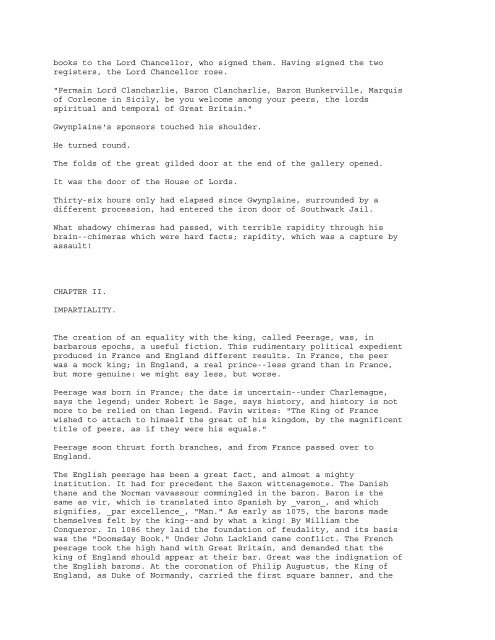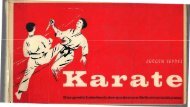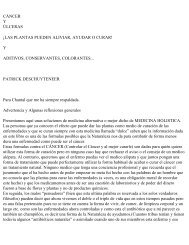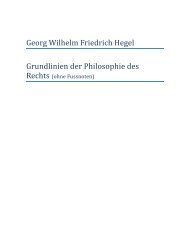- Page 1:
C t f C lit U i it li lib Courtesy
- Page 4 and 5:
I. Chesil II. The Effect of Snow II
- Page 6 and 7:
II. The Dregs CONCLUSION.--THE NIGH
- Page 8 and 9:
Pindarized. He could have vied in b
- Page 10 and 11:
him enough to sup on sometimes. In
- Page 12 and 13:
III. In the interior of the van the
- Page 14 and 15:
the king is not present; a viscount
- Page 16 and 17:
"James Cecil, Earl of Salisbury, ha
- Page 18 and 19:
IV. Ursus admired Homo. One admires
- Page 20 and 21:
not steal them. The kidnapping of c
- Page 22 and 23:
The vivisection of former days was
- Page 24 and 25:
subjected. This frightful surgery l
- Page 26 and 27:
conferred together. In the seventee
- Page 28 and 29:
who did not inform against the Comp
- Page 30 and 31:
on a reed scarcely bends it, and, f
- Page 32 and 33:
evening intermixed and blurred them
- Page 34 and 35:
cliff. This, however, revealed the
- Page 36 and 37:
He felt himself put outside the pal
- Page 38 and 39:
Every instant troubled barks hasten
- Page 40 and 41:
It might be about seven o'clock in
- Page 42 and 43:
In the vastness of dispersion he wa
- Page 44 and 45:
the child was a thing of which care
- Page 46 and 47:
was a signal: they all precipitated
- Page 48 and 49:
the man's. Experience is, however,
- Page 50 and 51:
CHAPTER I. SUPERHUMAN LAWS. The sno
- Page 52 and 53:
While the hooker was in the gulf of
- Page 54 and 55:
composition of contradictions, some
- Page 56 and 57:
which the sailors had thrown them.
- Page 58 and 59:
while he looked into space. "The me
- Page 60 and 61:
"It is an old round shot of our war
- Page 62 and 63:
some one in the deep,-- "I say, Yes
- Page 64 and 65:
"We ought to get into fifty-five fa
- Page 66 and 67:
"No." "Death is the east." "I'll st
- Page 68 and 69:
dance in which ships lead off with
- Page 70 and 71:
Cyclones, in our northern hemispher
- Page 72 and 73:
under a catafalque--such is the sno
- Page 74 and 75:
"You have not land to starboard." "
- Page 76 and 77:
While they were fastening him he la
- Page 78 and 79:
lighthouse is a mathematical figure
- Page 80 and 81:
No answer. No one on board knew how
- Page 82 and 83:
Spun round by the wind, tossed by a
- Page 84 and 85:
were ignorant of their whereabouts,
- Page 86 and 87:
Each wave, as they neared it, added
- Page 88 and 89:
ottom of the well of the abyss. In
- Page 90 and 91:
"The carpenter's box is overboard,
- Page 92 and 93:
From time to time the chief took a
- Page 94 and 95:
Galdeazun looked at the water-mark,
- Page 96 and 97:
"Mea culpa!" "Asi sea!" "Aro raï!"
- Page 98 and 99:
No voice answered him. He looked do
- Page 100 and 101:
The child's danger changed its form
- Page 102 and 103:
without a detail. There was now not
- Page 104 and 105:
corpse is the icicle of man. The na
- Page 106 and 107:
He had tripped upon the slopes of p
- Page 108 and 109:
CHAPTER IV. ANOTHER FORM OF DESERT.
- Page 110 and 111:
There, by chance and without select
- Page 112 and 113:
"Who?" "I." "You? Who are you? when
- Page 114 and 115:
"Here are clothes." He chose out of
- Page 116 and 117:
dressed, and swathed her in a rag,
- Page 118 and 119:
lawless wretches. Vagabonds are pun
- Page 120 and 121:
"I do not know." "How do you mean?
- Page 122 and 123:
and wife after the fashion of the a
- Page 124 and 125:
Raising his eyes, they met those of
- Page 126 and 127:
after the close of the revolution a
- Page 128 and 129:
III. Never was a situation more cle
- Page 130 and 131:
friends had long done him the honou
- Page 132 and 133:
epublican reveries. He did not appr
- Page 134 and 135:
James II. was a king, and affected
- Page 136 and 137:
and by royal licence, Marquises of
- Page 138 and 139:
Josiana was "the flesh." Nothing co
- Page 140 and 141:
Why object to such manners? Cynicis
- Page 142 and 143:
Lord David was ripening. Forty; 'ti
- Page 144 and 145:
There was the Hell-fire Club, where
- Page 146 and 147:
No one could train like him. The pu
- Page 148 and 149:
In Anne's time no meeting was allow
- Page 150 and 151:
From a certain point of view, the r
- Page 152 and 153:
An obscure but fattening servitude
- Page 154 and 155:
Barkilphedro assumed an attitude of
- Page 156 and 157:
"But few. But it's all the same. Th
- Page 158 and 159:
Court appointments are the drop of
- Page 160 and 161:
Patience, temperance, continence, r
- Page 162 and 163:
To poison the sting, from time to t
- Page 164 and 165:
is necessary--a man, a woman, someb
- Page 166 and 167:
filthy conjuring-books, dirty wills
- Page 168 and 169:
O my rich gentry, because you canno
- Page 170 and 171:
condensation, awaiting the gigantic
- Page 172 and 173:
"Madam," said the queen to Josiana,
- Page 174 and 175:
CHAPTER XII. SCOTLAND, IRELAND, AND
- Page 176 and 177:
Of the two combatants, one was an I
- Page 178 and 179:
They looked at each other, approach
- Page 180 and 181:
No one was cold now. They laid sixt
- Page 182 and 183:
transmutation? Why not? Needed ther
- Page 184 and 185:
That he had no remembrance of it wa
- Page 186 and 187:
crowd for ever before him and outsi
- Page 188 and 189:
and reserved serenity of her look,
- Page 190 and 191:
demanded the caterpillar in marriag
- Page 192 and 193:
URSUS AS TUTOR, AND URSUS AS GUARDI
- Page 194 and 195:
Orpheus and of Egide Binchois. Freq
- Page 196 and 197:
might have been dangerous. To be bl
- Page 198 and 199:
Nothing. Their happiness was comple
- Page 200 and 201:
other. These communicated by open s
- Page 202 and 203:
cover of an _Immolatus_, the faithf
- Page 204 and 205:
the threshold of the supernatural.
- Page 206 and 207:
have neither holes in his clothes,
- Page 208 and 209:
What! in the crowd which hungers an
- Page 210 and 211:
ugly, stupid, or old. I only mean t
- Page 212 and 213:
Trimalcion. Oh, that beautiful and
- Page 214 and 215:
day a sudden transition from the no
- Page 216 and 217:
_Vograat_ made the crossing from Lo
- Page 218 and 219:
Why did he stop? To listen. What to
- Page 220 and 221:
These are his merits. Of the other,
- Page 222 and 223:
Besides the small fry, the swallowe
- Page 224 and 225:
"What a pity that he should not be
- Page 226 and 227:
who had died but six months previou
- Page 228 and 229:
magnificence of the throne--an ill-
- Page 230 and 231:
"What does that mean?" "That means,
- Page 232 and 233:
"By what right?" "I am a philosophe
- Page 234 and 235:
"You have said that a converted Jew
- Page 236 and 237:
Æacus got out of the difficulty by
- Page 238 and 239:
tables, the walls, and retiring bac
- Page 240 and 241:
sewn all over the body of her dress
- Page 242 and 243:
distance. Ursus remained some momen
- Page 244 and 245:
herself and in others a tremor of v
- Page 246 and 247:
ut it was over. Dea alone remained.
- Page 248 and 249:
Forgetfulness fell more and more on
- Page 250 and 251:
he worked at the chaste contour of
- Page 252 and 253:
"At this hour to-morrow, be at the
- Page 254 and 255:
The crackling of the fire burst out
- Page 256 and 257:
Dilemmas, transient and at the same
- Page 258 and 259:
afterwards they were sitting opposi
- Page 260 and 261:
Ursus stooped down, and placed his
- Page 262 and 263:
He put the ends of his fingers to h
- Page 264 and 265:
order of England, somewhere in his
- Page 266 and 267:
When the wapentake, leading the fil
- Page 268 and 269:
CHAPTER V. A FEARFUL PLACE. The wap
- Page 270 and 271:
each stage. A private carriage, who
- Page 272 and 273:
CHAPTER VII. SHUDDERING. When Gwynp
- Page 274 and 275:
How long had they proceeded thus? G
- Page 276 and 277:
By the side of it was a table cover
- Page 278 and 279:
"Closer," said the sheriff. The jus
- Page 280 and 281:
proof has been continued according
- Page 282 and 283:
"Well?" said the sheriff. "He can s
- Page 284 and 285:
"My lord, will your lordship deign
- Page 286 and 287:
unknown to any one on earth, except
- Page 288 and 289:
the sufferer. "Hardquanonne! when b
- Page 290 and 291:
The wapentake acquiesced by a nod.
- Page 292 and 293:
nobility. Thomas Howard, Duke of No
- Page 294 and 295:
same. And on this point the chancel
- Page 296 and 297:
of the tide, storms, calms, breezes
- Page 298 and 299:
the queen in the same proportion as
- Page 300 and 301:
Beyond the colonnade there played i
- Page 302 and 303:
unknown system of wheels, and your
- Page 304 and 305:
As he spoke, Barkilphedro began to
- Page 306 and 307:
the blind man dazzled. Gwynplaine,
- Page 308 and 309:
opening in the darkness. The moth f
- Page 310 and 311:
depths full of boiling lava, has th
- Page 312 and 313:
The toad talked politics! But now I
- Page 314 and 315: the Green Box. Then he leaned over
- Page 316 and 317: agile spring of Gwynplaine, imitati
- Page 318 and 319: the benches will not give way. We s
- Page 320 and 321: of those who are in front of them,
- Page 322 and 323: "I lavish my onomatopies in vain."
- Page 324 and 325: "I have no leisure to be an Oedipus
- Page 326 and 327: "Three, four, five." He mused. "At
- Page 328 and 329: acks on Ursus, went to the right, i
- Page 330 and 331: Master Nicless felt himself impeach
- Page 332 and 333: closed door. The justice of the quo
- Page 334 and 335: The innkeeper smiled, and addressed
- Page 336 and 337: "Sir, be so good as to conclude thi
- Page 338 and 339: Gwynplaine--we will continue thus t
- Page 340 and 341: aker women of L'Ile Adam; the Duke
- Page 342 and 343: CHAPTER III. EVE. An octagon room,
- Page 344 and 345: admiration, which ended in fear. Mi
- Page 346 and 347: CHAPTER IV. SATAN. Suddenly the sle
- Page 348 and 349: She sank on the couch, and made him
- Page 350 and 351: eptile; dragon, but worm. Oh, I am
- Page 352 and 353: The face of the duchess, whose boso
- Page 354 and 355: "What are you doing here, Gwynplain
- Page 356 and 357: Gwynplaine, himself a peer of Engla
- Page 358 and 359: "My Lord Fermain Clancharlie, I am
- Page 360 and 361: Nansladron, 1305; Lord Baliol, 1306
- Page 362 and 363: This circular space was lighted by
- Page 366 and 367: Saxon under the Heptarchy; Danish u
- Page 368 and 369: of England held the throne in suspi
- Page 370 and 371: Besides the house of peers of Engla
- Page 372 and 373: the thing described. But what is hi
- Page 374 and 375: door-keeper opened the folding door
- Page 376 and 377: sterling, the annual income of Geor
- Page 378 and 379: "A republican? Not at all! He was s
- Page 380 and 381: letter was couched in the following
- Page 382 and 383: The peers in their minority were on
- Page 384 and 385: peerages--all were of the people, a
- Page 386 and 387: Lords Commissioners left the bench
- Page 388 and 389: solemn one, by a prodigious intensi
- Page 390 and 391: you call the Queen, the idea struck
- Page 392 and 393: so that instead of beginning life i
- Page 394 and 395: Thus shouted the young lords, their
- Page 396 and 397: eak down your oppression; when an a
- Page 398 and 399: HE WOULD BE A GOOD BROTHER, WERE HE
- Page 400 and 401: impertinently, and too old to answe
- Page 402 and 403: to find Ursus and Homo, to see Dea
- Page 404 and 405: not be in his. The whole house was
- Page 406 and 407: that he fathomed, at every supposit
- Page 408 and 409: this that had paralyzed him, especi
- Page 410 and 411: every ulcer, every agony, is resolv
- Page 412 and 413: ight to challenge his father!_" A f
- Page 414 and 415:
tempted. He had been drawn without,
- Page 416 and 417:
Homo wagged his tail. His eyes spar
- Page 418 and 419:
his mind. Still preceding Gwynplain
- Page 420 and 421:
Homo struck his tail softly on the
- Page 422 and 423:
ekindled elsewhere. It is a heartac
- Page 424 and 425:
anch-like tracery of blue veins, ho
- Page 426 and 427:
mingled and burst forth together. T
- Page 428 and 429:
"Mine is the joy of a grandfather."
- Page 430 and 431:
of passing pain. One feels a shudde
- Page 432 and 433:
"Farewell!" murmured Dea. And he pr
- Page 434 and 435:
[Footnote 14: Night, away! the dawn
- Page 436 and 437:
Become an Honorary Doctor You too m
- Page 438 and 439:
Honorary Doctorate Program Your ho
- Page 440 and 441:
Outstanding Honorees Among our hon
- Page 442 and 443:
How to apply for our honorary docto
- Page 444 and 445:
Ceremonies Prof. Dr. Pongracz, form
- Page 446:
Further Links Testimonials (unsolic








